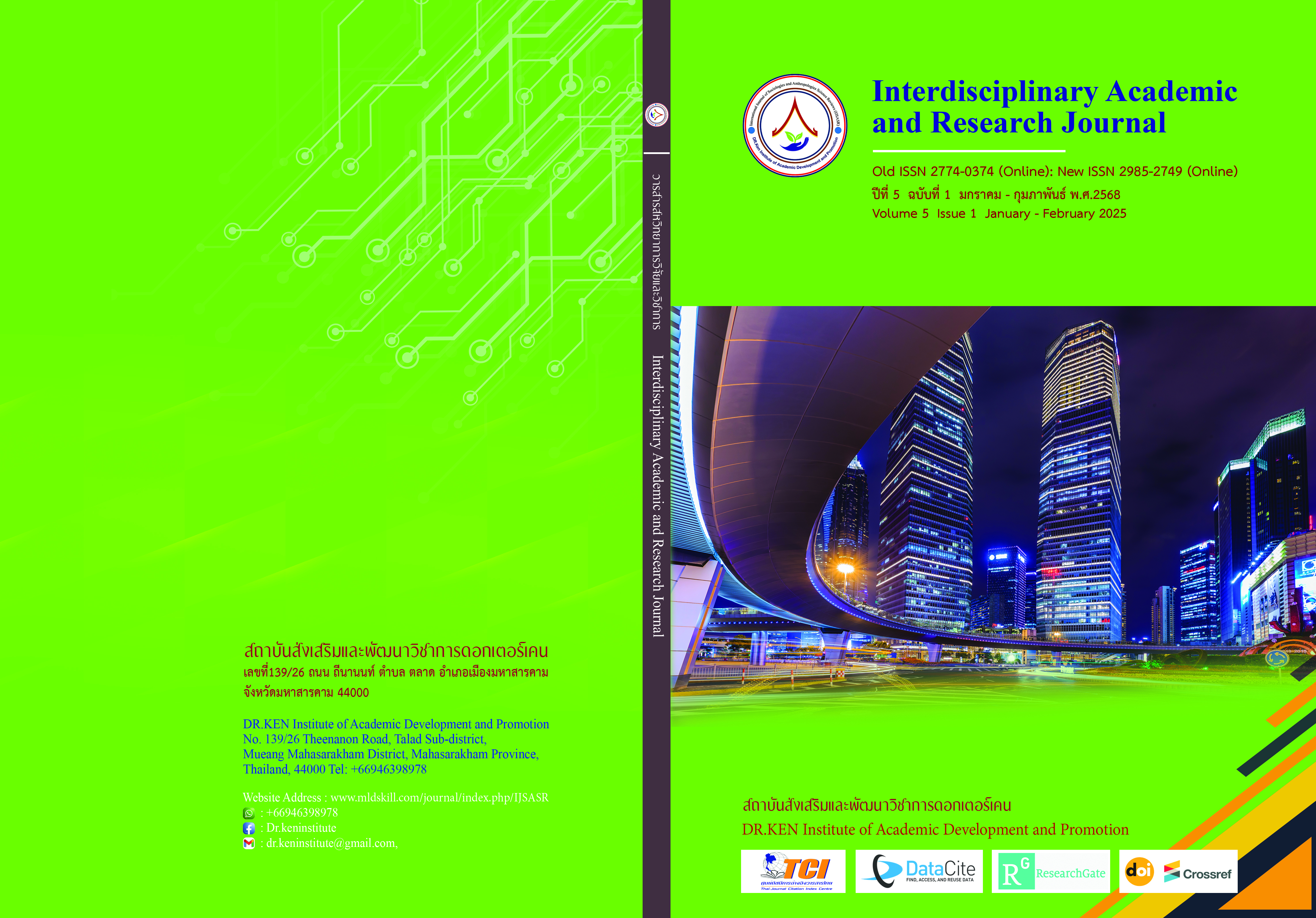Thai Dessert Promotion in Community to Drive the Foundational Economy through the Participation of the Thepleela Community Wang Thonglang District, Bangkok Thailand
DOI:
https://doi.org/10.60027/iarj.2025.283262Keywords:
Product development, Thai desserts, Occupational, GroupingAbstract
Background and Aims: "Wat Thep Lila Community" (Soi Ramkhamhaeng 39 Intersection 1) is a canal-side community situated on land belonging to the Crown Property Bureau. It is a densely populated area with a mixed population of Thai Buddhists and Muslims. The most pressing issue for the community is economic hardship, the COVID-19 pandemic. The economic downturn has led to reduced incomes, job losses, and a lack of stable employment opportunities, particularly for housewives and the elderly who seek supplementary income for their families. The community desires economic self-reliance. This research aims to (1) Study the community context, including the problems and obstacles faced in developing Thai dessert products within Wat Thep Lila Community, which could potentially drive the grassroots economy in Wang Thonglang District, Bangkok. (2) Examine the community's needs and willingness to participate in a collective effort to develop Thai dessert products as a means of stimulating the local economy in Wang Thonglang District, Bangkok. (3) Investigate potential development models for Thai dessert products, including marketing channels, to bolster the grassroots economy through community participation in Wat Thep Lila, Wang Thonglang District, Bangkok.
Methodology: This study is conducted as a Community-Based Research (CBR), involving the community in every step of the process. It is Participatory Action Research (PAR) that emphasizes collaborative learning between the community and researchers. The community actively participates in the research process. The target population includes groups such as the elderly, homemakers, low-income individuals, vulnerable groups, and those seeking supplementary income, totaling 22 participants. The research tools employed are: (1) surveys, (2) focus group discussions, (3) interview forms, (4) questionnaires, (5) field notes, (6) SWOT analysis, (7) participatory observation, and (8) study visits and knowledge exchange.
Results: Community Context: Wat Thep Lila Community has a predominantly elderly population with a significant number of transient residents renting accommodation. Residents lead disparate lives with diverse occupations, often lacking stable employment and organized occupational groups. Many rely on daily wages, and some groups are disengaged from community activities. The community is also affected by water pollution from sewage. Key challenges include income insecurity, lack of permanent employment, absence of hygienic facilities for food production, and limited marketing expertise. Community Needs: The community seeks solutions to economic challenges and recognizes the potential of their existing knowledge of Thai desserts to generate income through collective enterprise. This led to the registration of the "Wat Thep Lila Thai Dessert Occupational Group" based on the "5K" concept: (1) Group/Members: 34 members (2) Committee: Elected leadership (3) Rules and Regulations: Established guidelines for operation (4) Funds: Financial resources for group activities (5) Joint Activities: Monthly meetings, bi-weekly community markets, and support for community events.
Conclusion: This participatory action research project, conducted in collaboration with 22 community researchers from Wat Thep Lila, investigated the community context, explored the potential of Thai dessert products, and assessed the community's desire for collective economic action. This resulted in the successful registration of an occupational group based on the "5K" model and the development of a six-step product development framework. The project empowered the target group with Thai dessert production skills and facilitated the creation of a sustainable community enterprise in Wat Thep Lila.
References
คณะอนุกรรมการยุทธศาสตร์เศรษฐกิจฐานราก. (2559). คู่มือการส่งเสริมการพัฒนา “ระบบเศรษฐกิจฐานราก”. กรุงเทพฯ: สำนักสนับสนุนขบวนองค์กรชุมชน และสำนักสื่อสารการพัฒนา สถาบันพัฒนาองค์กรชุมชน (องค์การมหาชน).
ทักษญา สง่าโยธิน. (2563). การพัฒนาศักยภาพวิสาหกิจชุมชนกลุ่มจังหวัดภาคใต้ชายแดน เพื่อยกระดับความสามารถในการแข่งขัน. วิทยาลัยพาณิชยศาสตร์ มหาวิทยาลัยบูรพา.
มนสิชา อนุกูล. (2565). แนวทางการจัดการส่งเสริมกลุ่มอาชีพชุมชน ตำบลบางขะแยง อำเภอเมือง จังหวัดปทุมธานี. วารสารวิทยาการจัดการปริทัศน์, 24(1), 137-146.
วรวุฒิ โรมรัตนพันธ์. (2548). โครงการเสริมสร้างการเรียนรู้เพื่อชุมชนเป็นสุข. กรุงเทพฯ: โครงการเสริมสร้างการเรียนรู้เพื่อชุมชนเป็นสุข.
ศานติ ภักดีคำ. (2557). พจนานุกรมคำยืมภาษาเขมรในภาษาไทย. กรุงเทพมหานคร: อรุณ อมรินทร์ พริ้นติ้งแอนด์พับลิชชิ่ง.
สุชาดา ธโนภานุวัฒน์. (2558). รายงานการวิจัย เรื่อง การพัฒนามาตรฐานผลิตภัณฑ์ขนมไทยของชุมชนตรอก ข้าวเม่า เขตบางกอกน้อย กรุงเทพมหานคร. มหาวิทยาลัยราชภัฏธนบุรี.
สุภางค์ จันทวานิช. (2563). วิธีการวิจัยเชิงคุณภาพ (พิมพ์ครั้งที่ 25). กรุงเทพฯ: สำนักพิมพ์จุฬาลงกรณ์มหาวิทยาลัย.
สุวัฒน์ คงแป้น และ อักขณิช ศรีดารัตน์. (2548). บ้านมั่นคง ชุมชนร่วมสามัคคี. สถาบันพัฒนาองค์กรชุมชน (องค์การมหาชน). กระทรวงการพัฒนาสังคมและความมั่นคงของมนุษย์
Hussey, S. (2024). Why is Community Engagement Important?. Retrieved 19 March 2024 from: https://www.coursehero.com/file/149942201/Why-is-Community-Eqngagement-Importantdocx/
McCarthy, E. J., & Perreault, W. D. (1991). Essential of marketing (5th ed.). Boston: E. Jerome McCarthy and Associates.
Downloads
Published
How to Cite
Issue
Section
License
Copyright (c) 2025 Interdisciplinary Academic and Research Journal

This work is licensed under a Creative Commons Attribution-NonCommercial-NoDerivatives 4.0 International License.
Copyright on any article in the Interdisciplinary Academic and Research Journal is retained by the author(s) under the under the Creative Commons Attribution-NonCommercial-NoDerivatives 4.0 International License. Permission to use text, content, images, etc. of publication. Any user to read, download, copy, distribute, print, search, or link to the full texts of articles, crawl them for indexing, pass them as data to software, or use them for any other lawful purpose. But do not use it for commercial use or with the intent to benefit any business.
















.png)


